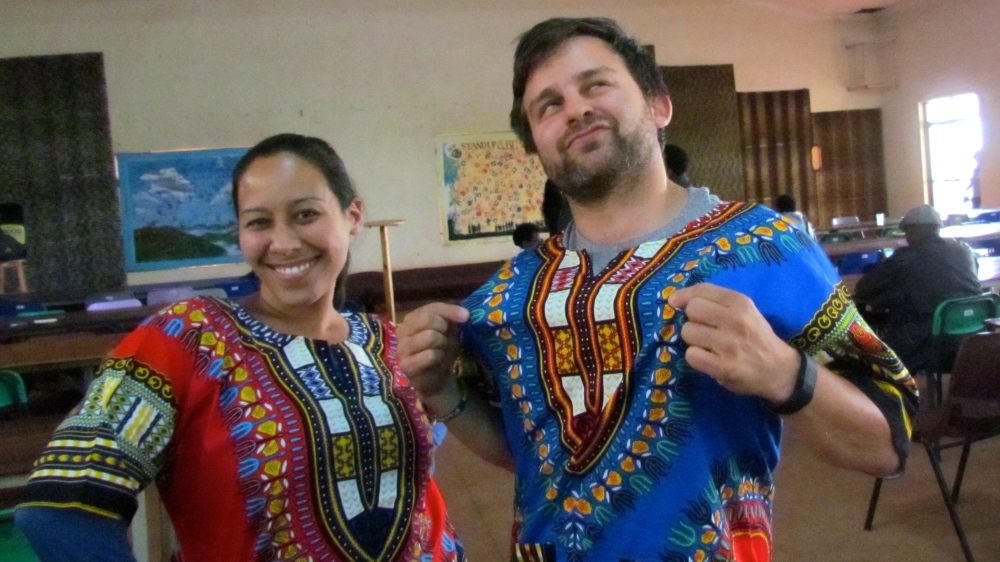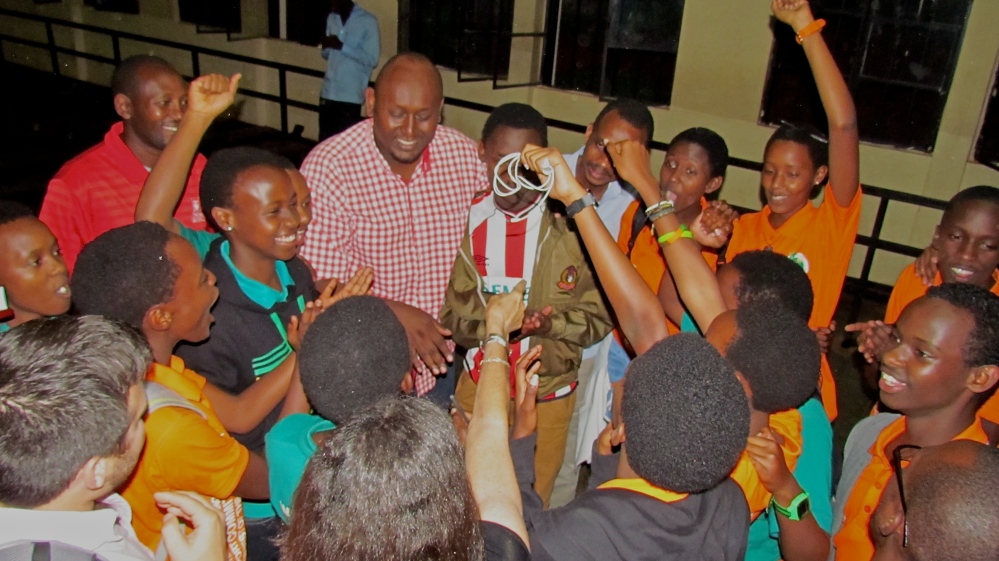
Reflections on #africamp
This is our final blog post for our four month trip to Africa. Instead of my usual pontifications, this blog is broken down into a number of “top ten lists” in order to succinctly share the highlights; enjoy!
The 10 Best Things We Did
Attend ASYV Debate Tournament
After being in the village for like two weeks, we joined the coaches and participants and spent a day in rapid-fire debates on the motion: The Rwandan government should significantly cut its current dependence on foreign aid. I learned a lot about the effects of foreign aid on Rwanda and the global south in general. But more importantly had an incredible day watching and coaching my team of three awesome girls who went on to win the city championship!
Akilah One-on-One meetings
The work we did at Akilah has meaningful in so many ways, and one of those ways in how it allowed us to jump on motos and meet with individuals around Kigali, whether it was worth current students, alumnae, or private sector employers who regularly hired interns and graduates from Akilah. The meetings gave Jamie and I an up-close look into the developing private sector of Rwanda and those who are building it from the ground-up.
Gorilla Trekking
Being close enough to see a fully grown silverback gorilla change its facial expression as it finishes eating one thing and considers if he wants to eat the next thing is…rad. Seriously, it was like close encounter of the best kind.
Driving the Garden Route (including Winelands)
South Africa is immersed in natural beauty and winding our way through the hills along the South and East Coast became like a 4 day drive through a series of impressionist paintings.
SAFARI!
Big Cats, Elephants, Hippos, Giraffes, Craters, Zebras, there is no better way to get lost in nature than safari in Masai Mara, Serengeti and Ngorogoro Crater.
Stonehenge
After safari, it was fitting to go from basking in the natural world to trying to pry into the minds of Neolithic men and women who used this site to…bury the dead? Observe the seasons? Pray? All of the above? Few places leave you with more questions that Stonehenge so obviously, we loved it.
Driving Tour of Capetown with Noel
Our driving tour with Noel was amazing because he showed us the sights and shared with us the stories of South Africa. Not just the ones that feel good to hear, about what a saint Mandela is or how great it was for Apartheid to be overthrown without a war. But he also told us the stories about government abuse and corruption that is severely souring the sweetness of what post-Apartheid South Africa could have looked like. For the comprehensiveness and the nuance that we learned, we will forever be grateful.
White Water Rafting down the Nile
Jamie and I are not extreme sporters but we like to have fun. Rafting the Nile was about as far as we could go. We paddled our way through a couple of Category 5 rapids, got stuck under a 14 foot waterfall (that we rafted over) and we capsized twice…each time there was like a half second when one part of me went “huh, is this how Jamie tells everyone that I died?” But anyway, it was super-super fun and wouldn’t trade it back for anything.
Attended Rwanda’s National Genocide Memorial at Amahoro National Stadium
While we didn’t see the Agahozo Shalom students perform, joining with Rwandans from around the country to come together to remember such a recent, painful, confusing and real trauma in ther collective psyche and individual lives was an honor. And because Rwandans are such hospitable people, we were welcomed into such a private, vulnerable moment with open arms and teary eyes. It was a moment through which I will feel connected to Rwanda for a very long time.
Spice Tour and Beach out in Zanzibar
With our volunteering and safari behind us, we took our last few days in Africa to check out Zanzibar, an island off the coast of Tanzania. While there we both went on a spice tour, where we used all five senses to learn more about how spices and herbs are planted, grow and are used culinarily, medicinally and cosmetically. We’ve done a lot of walking tours, but from this one we said, “Wait, but really?” way more than any other. Then we spent a few days to just sit on the beach at a resort and drink and eat like we were rehearsing for a Corona commercial. We stayed at the Beach Breeze Resort and I recommend it to all. We were also lucky because it was peak rainy season so prices were low, but it was still sunny and in the high eighties on most days. #winning.
10 Teachers and What They Taught Us
- JC, Executive Director of Agahozo Shalom Youth Village – showed us how to hit that balance of bringing the the right people to the table with the right jobs and supporting them, but in a way that lets them do what you hired them to do, and therefore thrive.
- Vincent, Village Director of Agahozo Shalom Youth Village – taught us how to look at a start-up and begin building, in order to go from good to great
- Ritah, Alumnae Affiars Manager at Akilah Institute for Women – taught us how to love a job through building the relationships through those you serve
- Aline, Country Director for Akilah Institute for Women – taught me about part of the psychology of Rwndans as refugees and what that means to their values and sense of self-value
- Noel, Tour Guide in Cape Town – taught us to look under the surface to see the stories less told in South Africa, post-Aparthied
- Nida, graduate of Akilah Institute for Women – taught us that where there’s a will there’s a way
- Francis, Tour Guide for Glory Safaris – taught us about the Maasai and how to consider the balance of thousands of years of traditions with modernity
- Jessica, Director of Registration and Career Development at Akilah Institute for Women – gave us a crash course in “Re-organizing the systems of your Start-up” through our work together at Akilah
- Maxime, graduate at Agahozo Shalom Youth Village – who inspired us with his ambition, belief in hard work, and gratitude and eagerness towards opportunities and uphill battles
- Phyllis, fellow volunteer at Agahozo Shalom Youth Village – taught us how to give without imposing, to support without commandeering, to give in the truest sense of the word
10 Assumptions Going to East Africa Tears Down
- Africa is too backwards for there to be significant progress any time soon.
- Africa is a great place to send charity to, not business contracts.
- African women are comfortable accepting a life similar to that of their mothers, grandmothers and great-grandmothers
- The best way for African problems to be solved is to find the equivalent problem in the US or Europe and just apply the model.
- Travelling in Africa is not safe.
- Unless they are rich, Africans do not speak English.
- Africans do not deal with issues around ‘colorism’ since almost everyone is black.
- Africa just needs “time” to get better.
- Africans think life is cheap.
- Africans are a “simple” people.
The 10 Things We Will Do When We Return to Africa
- Climb Kilimanjaro and do some Safari Hikes and Balloon Rides
- Do some work with African Innovation Prize
- Check out the Apartheid Museum in Soweto
- Attend Passover or Shabbat with the Abuyadaya in Uganda
- Stay over for a few nights in Addis Ababa
- See Victoria Falls in Zimbabwe
- Hike up a volcano in Virunga National Park in the Democratic Republic of Congo
- Spend more time in Capetown and the Winelands in South Africa
- Visit the Nyamatta Church Genocide Memorial in the Southern Province of Rwanda
- Hike around Namibia

#africampers out…for now.














